Introduction to Chinese Cinema
Chinese cinema, with its multifaceted history, is a vital aspect of the nation’s cultural landscape. It dates back to the early 20th century, emerging during a period of social upheaval and transformation. The first films were simple shorts, but as technological advancements occurred and societal changes took root, the industry began to flourish, encapsulating the evolving narratives of Chinese society. From the groundbreaking films of the 1920s to the globally recognized masterpieces of the 21st century, Chinese cinema has continually adapted and reinvented itself, reflecting both the challenges and triumphs of its people.
Notably, the role of actresses in Chinese cinema cannot be overstated. Throughout its history, female performers have significantly influenced both the film narratives and audience engagement, transcending cultural and social barriers. From the iconic performances in traditional Peking operas to contemporary portrayals in Hollywood co-productions, actresses have ensured that their perspectives and talents are recognized both nationally and internationally. These women have often been at the forefront of cinematic innovation, showcasing their abilities across various genres.
The evolution of Chinese film has been marked by significant milestones that have increased its visibility on the global stage. The rise of the Hong Kong film industry in the 1980s, characterized by action and martial arts films, brought international recognition to Chinese actresses. Similarly, the art-house movements and films that highlight social issues have contributed to the diversification of portrayals and narratives within the industry. As the landscape of Chinese cinema continues to evolve, actresses remain integral to the storytelling process, embodying both cultural heritage and modernity, while captivating audiences around the world.
Criteria for Selection
When compiling a list of the top ten most impressive Chinese actresses, several criteria were meticulously considered to ensure a fair and comprehensive evaluation. The following factors played a pivotal role in the selection process:
Firstly, acting skills served as a primary criterion. This encompasses the actress’s ability to portray a wide range of characters convincingly. Exceptional talent in interpreting complex roles, emotional depth, and nuance is essential in distinguishing truly outstanding performers within the Chinese film. Many of these actresses have demonstrated remarkable capabilities by showcasing their talents across diverse genres, from drama and romance to action and comedy.
Secondly, versatility is a significant factor. The ability to adapt to various roles and genres defines a great actress and reflects her range and commitment to her craft. Actresses who can seamlessly transition from serious, challenging roles to light-hearted, comedic performances often garner greater acclaim within the industry. This adaptability enhances their appeal to a broader audience and establishes them as celebrated figures in Chinese cinema.
Another essential aspect is box office success. Financial performance in terms of ticket sales for their films is a crucial measure of an actress’s popularity and marketability. Successful actresses contribute significantly to the overall success of the films in which they star, which in turn reinforces their standing in the industry.
Awards and nominations also factor prominently into the selection criterion. Recognition from peers and industry experts through prestigious awards highlights an actress’s dedication and impact within the cinematic landscape. Consideration of accolades received throughout their careers provides insight into the level of excellence and influence they have achieved.
Finally, influence in the film industry is a vital component. The impact an actress has on shaping trends, paving the way for future generations, and contributing to the representation of women in cinema substantiates their significance in the cultural narrative.
These criteria combined form a thorough framework to recognize the remarkable talents of these actresses within a highly competitive industry.
Fan Bingbing: The Unstoppable Force

Fan Bingbing has solidified her position as one of the most impressive Chinese actresses in contemporary cinema. Rising to fame in the early 2000s, she gained widespread recognition through her diverse roles in television dramas and films. Notably, her portrayal of Jin Suo in the popular series “My Fair Princess” catapulted her into the limelight and established her as a household name in China.
Over the years, Fan has skillfully navigated the intricacies of the entertainment world, showcasing her versatility in various genres, from historical epics to modern romantic comedies. Her performance alongside international stars in films like “X-Men: Days of Future Past” and “Iron Man 3” has not only garnered her fame beyond China’s borders but has also contributed to her reputation as a dynamic actress capable of holding her own in Hollywood. This international recognition marks a significant achievement in her career, making her a prominent figure in modern Chinese cinema.
Fan Bingbing’s influence extends far beyond her acting prowess; she has made significant strides in the fashion industry as well. Renowned for her striking style and elegance, she has been a regular feature on red carpets worldwide, earning accolades for her fashion choices. Her collaboration with various high-profile brands and appearances as a muse in editorial spreads further underscore her status as a fashion icon. Additionally, as a philanthropist and a strong advocate for various social causes, she embodies the qualities of a modern celebrity who actively contributes to society.
Through her continued achievements and multifaceted career, Fan Bingbing stands as an unstoppable force in the entertainment industry, inspiring a new generation of artists and leaving an indelible mark on both Chinese and global cinema.
Zhang Ziyi: A Global Icon

Zhang Ziyi, a renowned figure in the cinematic world, has garnered international acclaim for her extraordinary talent and captivating performances. Born on February 9, 1979, in Beijing, Zhang first attracted global attention with her stunning portrayal of the skilled warrior, Jen Yu, in the critically acclaimed film ‘Crouching Tiger, Hidden Dragon’ (2000). This film not only showcased her remarkable martial arts capabilities but also served as a bridge between Eastern and Western cinema, highlighting Zhang’s potential as a global actress.
Following this breakthrough role, Zhang Ziyi’s career continued to soar as she starred in various prominent films, including ‘Memoirs of a Geisha’ (2005), where she assumed the role of the enchanting Sayuri. Her performance earned her significant recognition within Hollywood, ultimately leading to multiple award nominations. Through her roles, Zhang has often portrayed strong female characters, reflecting a development in the representation of women in film, thereby impacting cultural narratives in both Eastern and Western contexts.
Throughout her career, Zhang has been honored with several prestigious awards, including the Best Actress award at the Cannes Film Festival for ‘The Road Home’ (1999), affirming her ability to captivate audiences with her versatile acting skills. Furthermore, Zhang Ziyi has effectively served as a cultural ambassador, promoting Chinese cinema and acting as a bridge between diverse film industries.
Her influence extends beyond the silver screen, as she has contributed significantly to the rise of Chinese cinema’s presence on the global stage. As a testament to her status as a global icon, Zhang Ziyi continues to inspire countless aspiring actresses in China and beyond, exemplifying how determination and talent can transcend cultural boundaries in the world of film.
Gong Li: The Art of Performance

Gong Li stands as a monumental figure in the realm of Chinese cinema, celebrated not only for her striking beauty but also for her remarkable versatility as an actress. Over the course of her career, she has consistently demonstrated her ability to embody complex characters, rendering her performances both nuanced and compelling. Her collaborations with critically acclaimed directors, especially Zhang Yimou, have played a pivotal role in popularizing Chinese cinema on a global stage.
Gong Li’s early work with Zhang Yimou, which includes landmark films such as “Red Sorghum” and “Raise the Red Lantern,” showcases her extraordinary talent in interpreting intricate roles that resonate with deep emotional weight. Each character she portrays reflects an aspect of the human experience, making her performances relatable across cultures. This skillful manipulation of emotion underscores her artistry, as she captures the intricacies of her characters’ internal struggles and desires, often set against the backdrop of rich cultural narratives.
Moreover, Gong Li’s longevity in the film industry is a testament to her adaptive skills and unwavering commitment to her craft. Throughout her illustrious career, she has seamlessly transitioned between various genres and styles, maintaining relevance in a continuously evolving cinematic landscape. Her presence has not only inspired audiences but also paved the way for a new generation of actresses in China. Many young aspiring talents look up to Gong Li as a role model, noting her dedication to authenticity and the depth she brings to every role.
Incorporating both traditional Chinese elements and contemporary themes into her performances, Gong Li has elevated the portrayal of women in cinema. Her influence can be seen in the work of numerous actresses who, inspired by her artistry, strive to bring complex female characters to life. As her legacy continues to shape the industry, Gong Li undeniably remains a defining force in the world of film.
Liu Yifei: The Fairy Queen

Liu Yifei, often referred to as the “Fairy Queen,” has captivated audiences with her ethereal beauty and exceptional acting prowess. Born on August 25, 1987, in Wuhan, China, she began her career in the entertainment industry at a tender age, garnering attention for her role in the television series “The Return of the Condor Heroes” in 2006. This early success paved the way for her transition from television to major film projects. Liu Yifei quickly became a household name in China, earning acclaim for her performances in various genres, from historical dramas to fantasy films.
One of the most notable milestones in Liu Yifei’s career is her starring role in Disney’s live-action adaptation of “Mulan,” which was released in 2020. In this film, she portrayed the strong-willed Hua Mulan, a character that signifies bravery and resilience. Liu’s portrayal won praise for its authenticity and depth, effectively bringing forth a narrative that resonates powerfully with the audience, particularly in an era that embraces strong female protagonists. Her commitment to representing such characters underscores her dedication to shifting cultural narratives surrounding women in film.
Liu Yifei’s influence extends beyond her acting. As a prominent figure in popular culture, she represents a growing interest in Asian cinema and the importance of diverse storytelling in Hollywood. Her career trajectory highlights not only her individual achievements but also the evolving landscape of the film industry, where actresses from different backgrounds are increasingly taking center stage. Liu Yifei’s journey serves as an inspiration to many aspiring artists and remains a testament to the potential for cross-cultural representation. Through her distinguished work, she continues to redefine the roles available for women in film.
Li Bingbing: Versatility and Awareness

Li Bingbing is a prominent figure in the world of acting, renowned for her versatility and prowess across various genres in both Chinese and Hollywood films. Her career spans more than two decades, showcasing an impressive portfolio that ranges from action-packed thrillers to poignant dramas. This adaptability has made her a sought-after actress, not only in Asia but also in international cinema. Li gained recognition early in her career with roles in popular Chinese films such as “The Matrimony” and “Detective Dee: Mystery of the Phantom Flame”, where her ability to embody complex characters shone through.
In her pursuit of global appeal, Li Bingbing ventured into Hollywood, marking her presence with performances in major productions such as “Transformers: Age of Extinction” and “The Meg”. These roles allowed her to showcase her skills on a grander scale, aligning her with the ever-evolving landscape of the film industry. Through her work, she has been able to bridge cultural divides and expose her talent to a broader audience, further establishing her as a versatile actress capable of transcending linguistic barriers and appealing to diverse viewers.
Beyond her impressive acting portfolio, Li Bingbing is actively engaged in environmental advocacy, which significantly complements her on-screen endeavors. Her commitment to raising awareness about environmental issues, particularly in relation to wildlife conservation, highlights her passionate involvement in sustainability efforts. By leveraging her platform, she has used her influence to initiate campaigns and participate in initiatives aimed at preserving natural habitats and promoting eco-friendly practices. This intersection of her artistic endeavors and environmental consciousness illustrates a deep-seated awareness that enriches both her performances and her public persona. In essence, Li Bingbing exemplifies how an actress can integrate her passion for acting with a meaningful cause, creating a harmonious blend of artistry and advocacy.
Tang Wei: A Star Reborn

Tang Wei’s career underwent a remarkable transformation following her debut in Wong Kar-wai’s acclaimed film, ‘Lust, Caution.’ Initially drawing attention for her compelling performance, Wei faced significant challenges due to the provocative nature of the film. However, her resilience and dedication to her craft have led to a resurgence that solidified her status as a prominent figure in the Chinese film industry.
After ‘Lust, Caution,’ Tang Wei took on a variety of roles that showcased her exceptional versatility. Films such as ‘Finding Mr. Right’ and ‘The Golden Era’ displayed her ability to navigate diverse genres, ranging from romantic comedies to historical dramas. In each performance, she brought depth and nuance to her characters, allowing audiences to connect with their emotional journeys. This dedication to character development not only garnered critical acclaim but also established Tang as an actress who is unafraid to tackle complex roles.
Moreover, her unique approach to character portrayal has set her apart from many contemporaries. Wei immerses herself in her roles, often engaging in extensive research and preparation. This commitment to authenticity resonates in her performances, creating a sense of realism that captivates viewers. Her ability to convey subtle emotions and intricate relationships has led to numerous accolades, including prestigious awards that recognize her talent and hard work.
Over the years, Tang Wei’s presence in the film industry has evolved significantly. From a breakout star to a seasoned actress with an impressive repertoire, her journey serves as an inspiration for aspiring performers. The resurgence of her career exemplifies the power of perseverance in the face of adversity, reinforcing her position as one of the most impressive actresses in contemporary Chinese cinema. Through her work, Tang Wei continues to demonstrate the lasting impact of dedication and artistic integrity in the competitive landscape of film.
XU QING: THE VETERAN TALENT

Xu Qing is a distinguished figure in the realm of Chinese cinema, boasting an illustrious career that has persisted for over two decades. Renowned for her remarkable versatility, she has successfully navigated the evolving landscape of film, demonstrating a keen ability to adapt to shifting trends and audience preferences. From her early roles in television dramas to her more recent appearances in critically acclaimed films, Xu Qing’s performances have consistently received accolades, showcasing her extensive range as an actress.
Beginning her career in the 1990s, Xu quickly gained prominence with her captivating portrayals in various genres, including romance, historical dramas, and action films. This adaptability is one of her hallmark traits, allowing her to traverse different cinematic styles while remaining at the forefront of the industry. Her notable performances in films such as “The Message” and “The Last Tycoon” further cement her status as an influential actress, capable of carrying complex characters with grace.
Moreover, Xu Qing has made significant contributions to the representation of women in Chinese cinema. Her roles often challenge traditional gender norms, allowing her to inspire a new generation of actresses. Younger talents frequently cite her as a source of motivation, acknowledging the path she has paved in an industry that continues to grapple with gender dynamics. This influence extends beyond her on-screen roles; she is also known for her mentorship and support of aspiring actresses, demonstrating her commitment to fostering new talent in the industry.
As an iconic figure, Xu Qing’s enduring legacy in Chinese cinema serves as a testament to her skill and dedication. Her ability to remain relevant while influencing others exemplifies the qualities of a true veteran talent. The impact of her career will undoubtedly resonate for years to come, contributing to the advancement of women in film and inspiring countless performers to embrace their craft with passion and resilience.
Conclusion: The Future of Chinese Actresses
As we reflect on the remarkable achievements of the Chinese actresses highlighted throughout this blog post, it is essential to consider the trajectory of women in Chinese cinema in the coming years. The actresses mentioned have not only garnered recognition for their individual talents but have also significantly contributed to the evolving landscape of the film industry. With their diverse roles, these women have paved the way for emerging talents, challenging traditional representations and stereotypes often associated with female characters in film.
The future of women in Chinese cinema appears increasingly promising. Emerging actresses are beginning to take center stage, showcasing their skills in both domestic and international markets. This trend speaks to a broader movement within the industry wherein female portrayals are becoming richer and more nuanced. The rise of platforms that prioritize diverse storytelling enables these actresses to explore a breadth of roles that resonate with modern audiences while also reflecting social realities and cultural narratives.
Moreover, the globalization of the film industry presents a unique opportunity for Chinese actresses to reach wider audiences. Collaborations with international filmmakers and participation in projects that traverse cultural boundaries highlight the potential for cross-cultural representation. As the film industry continues to evolve, actresses from China are likely to play crucial roles in shaping the future of global cinema.
In summary, the journey of Chinese actresses is an inspiring narrative of growth, resilience, and empowerment. As they continue to break barriers and inspire future generations, it is evident that the future of women in Chinese cinema will be characterized by increased visibility, dynamic roles, and a commitment to storytelling that encapsulates the multifaceted nature of society.
